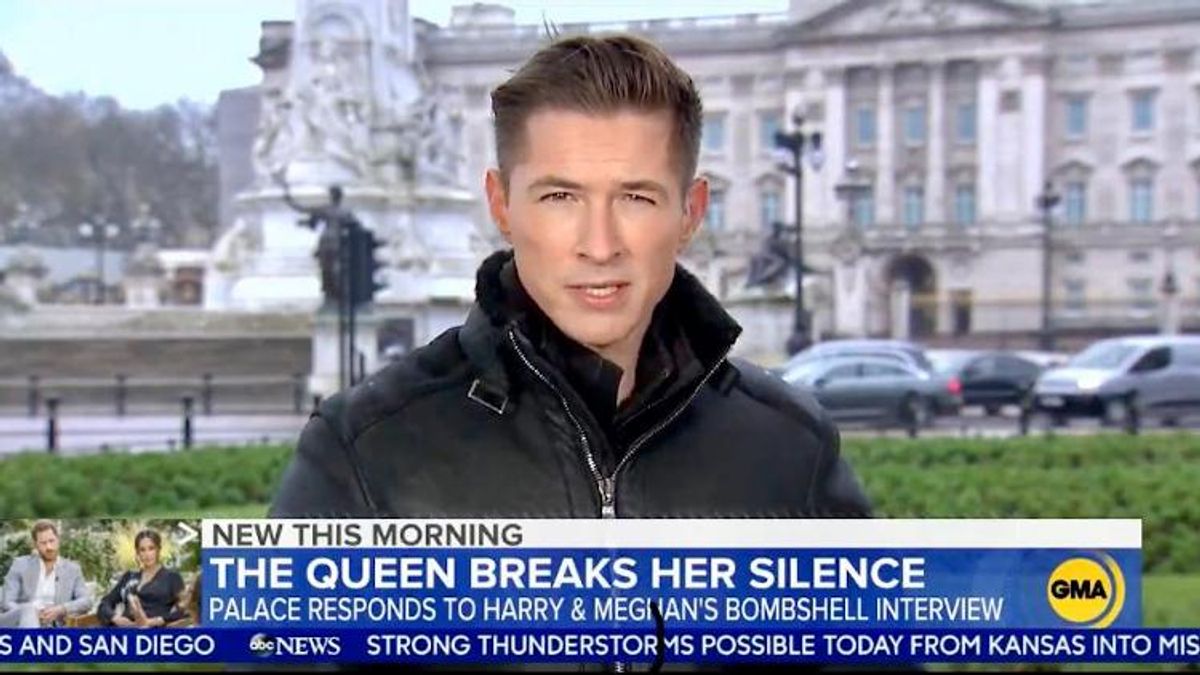Like everyone else, I was getting a little tired of all the pre-publicity for Oprah's interview with Meghan and Harry, the self-exiled, California-based, Duke and Duchess of Essex. There was that and the drip, drip, drip of reports of bullying by Meghan, presumably leaked by the Royal Family, aka "The Firm" prior to the interview in an obvious attempt to offset any incriminating statements by the Duke and Duchess. As an aside, I think that was an epic fail.
When the time came to watch the interview, my phone blew up with notifications that, among others, the The New York Times and CNN were covering the event live, via instant insight from their reporters. "Seriously?" I questioned. "Why are these reputable news outlets going all out for Meghan and Harry?" I was intrigued, but rather than watch the program, I started to monitor what the Times reporters were saying about the interview of this young 21stcentury.
The more they began to describe the interview, the more I became interested, and eventually relented and switched channels. And like everyone else, I wondered, as I watched, why I should be concerned about the trials and tribulations of this excessively privileged pair? But then, Meghan dropped two bombs that made me think about the broader inferences of the interview.
Now that the interview has had time to sink in, I wondered about all the reactions. The announcement from Buckingham Palace, 48 hours after the airing of the interview here in the U.S., seemed to be an acknowledgement that there was some remorse. Did public opinion in favor of Meghan sway the monarchy? What is going on behind the walls of Buckingham Palace? For some context, I reached out to out reporter James Longman, who has been covering the aftermath of the interview for ABC News in London to provide some explanation about all the machinations.
"I think there's a divide in reaction between people in the United States and those of us in the United Kingdom, because this interview was first for us for several reasons here in Britain, and there's also a generational divide," explained Longman, who spoke with me from his reporting post outside of Buckingham Palace. "Older people are reluctant to hear too much about the Royal Family. And younger people look at Harry and Meghan as part of their generation and are more willing to hear what they have to say."
Longman added the uniqueness about this situation to those in Great Britain was the fact that Harry, a member of the Royal Family, also participated in this interview. "It's always been outsiders, like Diana and now Meghan, and staffers who have left and disclosed the inner workings of the Palace, and so British society, or the world actually, has never seen anyone within the Royal Family speak out like Harry did. Many people are more interested because it involves the dynamic between the Queen and her favorite grandson."
By now we all know that the most alarming comments from the interview were Meghan's claim that there were several members of the Royal Family who questioned the skin color of Meghan and Harry's son, Archie, before he was born. When Oprah elicited her, "Whoa" in response, I did too. This was a viciously serious allegation, and as a PR person, I knew that the implications would be far reaching.
"What Meghan said raised so many questions, and was quite shocking," Longman observed. "People want more detail about what exactly happened, and who said what to whom. Oprah handled the interview very well, but a lot was left unsaid. The comments about skin color are having people ask, 'When was this said?' 'In what context?' 'Was Meghan present?' And of course, 'Who would say such a thing?'"
"I think it's important to remember what Meghan represented when she came into the Royal Family," Longman continued. "She embodied something different, a more modern and 21st-century approach to diversity and inclusion, which was a major shift forward for the monarchy. For People of Color, she provided hope for change and for representation. Now that has all gone badly wrong, and many People of Color are angry because they feel it might have been all a lie.
"Meghan had her story down and has her own text messages and emails that proves it was the case. I don't know that the palace will go tit for tat. Now, individual members of staff may leak from the palace, and work to defend the palace, but this was really going on behind the scenes. The Queen may want it to go away, but people who work in the palace might feel the attention to Meghan and Harry has been too one-sided."
When you think about it, centuries of British Royal Families have existed as lily white, so should it come as a surprise that questions were raised about the ethnicity of Archie? Moreover, now that it is out in the public sphere, and the backlash of anger pretty severe, I asked Longman if he thought, at some point, the Queen, though she may want it to just go away, might be forced to come forward to address the nation and defend the monarchy from racism?
"I don't think so, because the goal of the monarch is to stop this. If the Queen goes on TV it becomes an even bigger event. One thing that is difficult for people to understand is that there is the Royal Family as a family. And then the Royal Family as "The Firm." Meghan talked about The Firm, but in some aspects it's not related to the institution of the monarchy. It's complex and difficult to understand. And I think the Queen may view this as personal and within the bounds of family, so there's less of a need to involve the British public, and thus she will refrain from saying anything."
In that manner, I asked Longman why it took so long for Buckingham Palace to come forward with a statement professing sadness and concern about the issue of racism the couple made? "Well, there's a couple things. First the Palace never works for or around anyone else's schedule. They are very deliberate with any announcements they make. The second is that the Palace did respond within 24 hours after British TV aired the interview. The allegations made were hugely serious, so Buckingham Palace needed to take some time to strike the right tone. It's really a lesson in crisis management because the goal of the Palace is not to pour any more fuel on the fire."
To Longman though, there was a hint of denial in the statement that was released with the wording that "some recollections may vary."
"Meghan has her version. And the Royal Family has another. The monarchy does not want to air this in public. But, what's unusual to some is that they were willing to open an investigation into Meghan's bullying, yet there's been no talk of a public investigation into Meghan's allegations. And the reason for that is that this might not be an HR issue since Meghan isn't a member of staff. She is technically a member of the family. Regardless, by launching an investigation into what Meghan said would only further this crisis."
Since this wasn't a company HR issue per se, it might explain why Meghan's claim of suicidal thoughts during her captivity, for lack of a better term, were largely ignored. Having suffered myself through a long bout with severe depression, I recognized that this should not be looked at as a flippant comment. Admitting to thoughts of ending your life is stone-cold serious. What makes this baffling is that Harry and his brother William started a foundation "Heads Together," designed to "change the conversation on mental health;" however, Harry admitted to being afraid to even have a conversation about Meghan's mental health with the Royal Family.
Given this dynamic, and the fact that Meghan is clearly being portrayed as the victim, I asked Longman about that bullying investigation. Won't the monarchy just drop it in deference to what Meghan alleges she has been through?
"Actually, I think the Palace will push on that," Longman corrected. "To be clear they're not out of thin air. The head of household came to Buckingham Palace with two complaints from individuals about Meghan's behavior in 2018, so this has all been going on for some time."
The issue, according to Longman, is the double standard this investigation presents to the Palace. "There is a careful approach, and a real double standard around Andrew. There is no investigation being undertaken about his involvement with Jeffery Epstein, and that's a much more serious charge, and raises a lot of questions."
Like why are people so utterly fascinated by what goes on behind the palace walls? With Harry and Meghan, is it because of the charges about racism and mental health, or is it because of this obsessive fascination with the Royal Family? "Probably both," Longman surmised. "Drama around the Royal Family is not new, and the British people really do want intriguing drama. We lap it up, and it sells here and all over the world. The idea of pitting one family member against another is absorbing."
Finally, Longman said that a lot of people are confused about what Harry's objective was in doing the interview in the first place. "Harry mentioned to Oprah that he wants to mend fences with his family, so why then did he do the interview? He has to know the Palace isn't capable of doing what he and Meghan did, which is talk so openly on television for three hours. The palace is not equipped to go on television and reveal personal issues. While they are a powerful institution, TV land is not a place where they are good. In that regard, Harry outflanked them."
John Casey is editor at large for The Advocate.


















































































